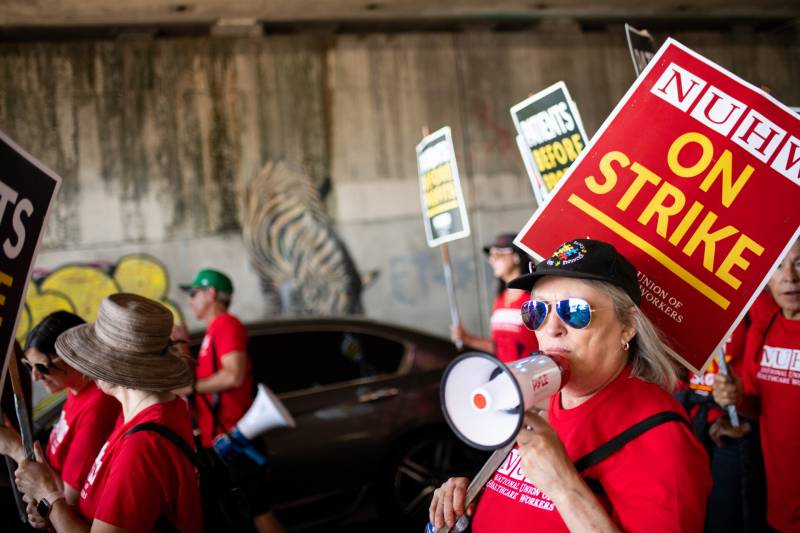The hard-fought deal between the Oakland-based health care giant and the National Union of Healthcare Workers — the union representing Kaiser therapists, social workers, chemical dependency counselors and other mental health staffers in the Bay Area and Central Valley — was reached earlier this week after Sacramento Mayor Darrell Steinberg stepped in to mediate. Thursday’s official approval of the agreement ends the longest strike among mental health care workers in U.S. history, according to the union.
In a statement, Kaiser officials said they were “very pleased at the outcome” of the vote.
“We appreciate our therapists’ confidence in this agreement, which addresses the concerns they expressed, while upholding Kaiser Permanente’s commitment that any agreement must protect and enhance access to mental health for our members,” the statement said. “We are glad to have all our employees back, caring for their patients.”
Workers first walked out on August 15, amid accounts of widespread burnout, retention issues and unsafe therapist-to-client ratios — sometimes resulting in patients having to wait as long as three months to see a therapist, workers said.
Early on in the strike, Ilana Marcucci-Morris, a licensed clinical social worker in Kaiser’s psychiatry department in Oakland, said burnout and poor working conditions were contributing to dismal retention rates among employees, and making it difficult for the company to recruit new ones.
“There isn’t a shortage of clinicians. There’s only a shortage of clinicians that want to work for Kaiser,” Marcucci-Morris told KQED’s Forum in August. “We get into this field to help people, and it’s hard to recruit therapists when Kaiser’s reputation is known to make people wait so long for therapy sessions. It’s really, really not ethical.”
Pressure mounted on Kaiser to resolve the impasse, as striking workers garnered support from notable state lawmakers, including Lt. Governor Eleni Kounalakis, state Senate President Pro Tempore Toni Atkins, state Sen. Scott Wiener (D-San Francisco), and Assembly Speaker Anthony Rendon.
“The day is going to come where the people of this country … truly have access to behavioral health care and mental health care that they need, that they deserve,” NUHW President Sal Rosselli told striking workers last Friday, speaking from the steps of Kaiser’s downtown Oakland offices, after announcing that Steinberg had agreed to mediate. “And when that day comes, historians are going to point to this strike, this union strike, as the catalyst that made it happen.”
Natalie Rogers, a Kaiser therapist in Santa Rosa, was among scores of employees who breathed a collective sigh of relief on Thursday, after not receiving any compensation for 10 weeks.
“I think we are all happy that we are going back to work. As you could imagine, it was definitely a financial strain, and an emotional strain,” Rogers said. “But I think that we have formed a unity like no other. I think that we now know … what we are capable of doing if we stick together.”
And because of that, she added, morale will be higher. “We will have the support from one another that we need to help push Kaiser to where we feel our patients will get the best care,” she said.
This story includes reporting from KQED’s Lesley McClurg.

